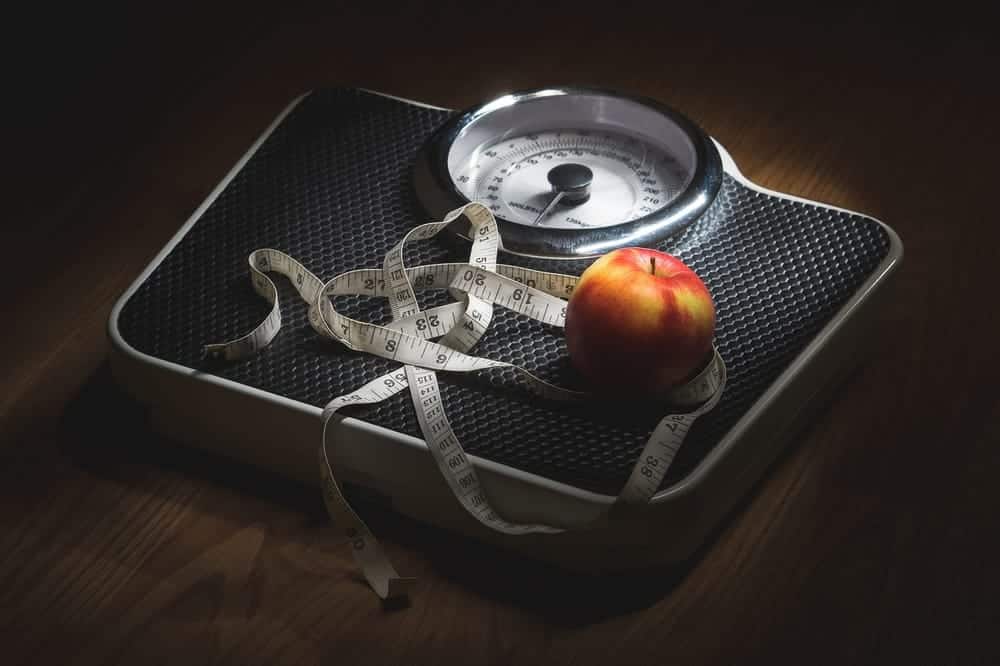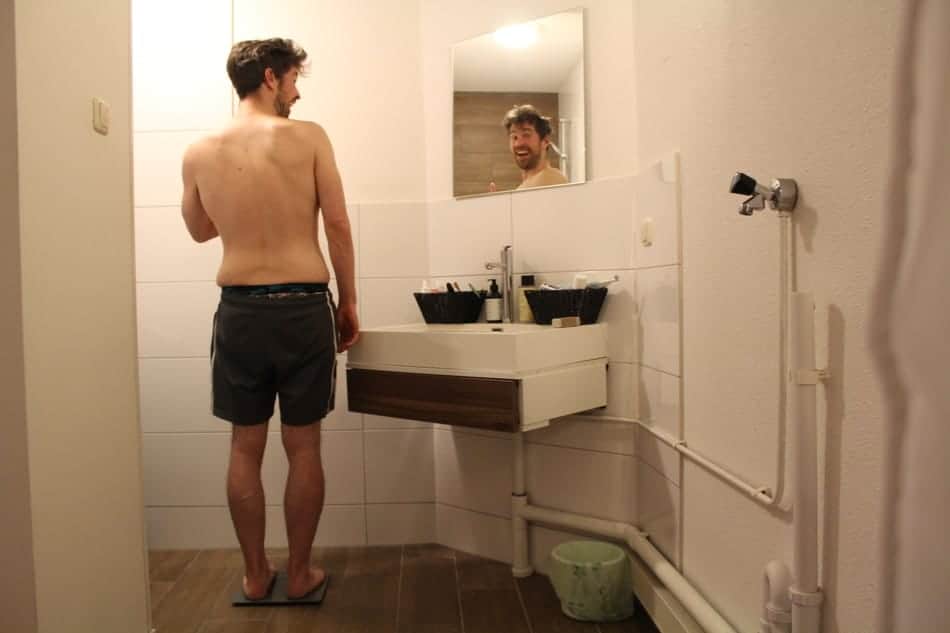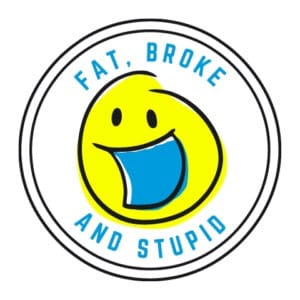
Have you ever weighed yourself, eaten and/or drank something, and then weighed yourself immediately afterwards? If you are like me, then you either found the results hilarious or depressing.
Our weight fluctuates throughout the day, often by a surprisingly large amount. While the debate lingers on with respect to how often we should weigh ourselves, today’s question is more specific: How long should we wait to weigh ourselves after eating? After researching and experimenting with the topic, I believe that for any useful data on your weight fluctuations…
It is best NOT to weigh yourself after eating at all. The weight on the scale will be temporarily exaggerated, thus not reflecting your “true” weight. It is better to wait until the next day. Weigh yourself first thing in the morning, under the same conditions each weigh-in, to have any useful data.
By all means, feel free to weigh yourself whenever and how often you like. While I recommend only weighing yourself once-a-day, first thing in the morning, preferably after you pee, and always under the same conditions, your weigh-in philosophy and goals may differ from mine.
Regardless, here is some more information to consider when answering the title question:
- How Much Can Your Weight Change After Eating?
- Goals Matter: Why Are You Weighing Yourself?
- But Really, How Long Should I Wait?
- The Mirror Holds More Weight Than the Scale
- Related Questions
How Much Can Your Weight Change After Eating?
According to an article by Self, drinking just a cup of water can add up to half a pound to the scale. They also note that most of our meals consist of 20 percent water to go along with 80 percent of whatever else your meal consists of.
All joking aside, this means that your weight before-and-after eating can change dramatically, and that much of this weight increase is due to water intake.
According to an article by A Workout Routine, it is possible, if not normal, for your weight to fluctuate by as much as 10 lbs. during the course of a day!
That’s pretty amazing!
So, depending on the size of the meal, how much you drink during the meal, and even which meal of the day you are eating, you could potentially see your weight increase by 5 lbs. or more.
Not all meals are created equal, and this variation is one of the many reasons why it is just best to avoid weighing yourself altogether after a meal. Like investing in Bitcoin, you might just end up driving yourself crazy watching the scale going up and down all day long.
Goals Matter: Why Are You Weighing Yourself?
People weigh themselves for different reasons. These reasons will alter when it makes sense to weigh yourself. For example:
Weight Loss Tracking: Maybe you are an athlete cutting weight, a bodybuilder preparing for a competition, in medical need of weight loss, an Average-Joe wanting to shed a few extra pounds, or summer is coming… whatever your motivation, you need to lose weight.
In these cases, there is often a target weight loss goal in mind. To have significant and useful data, you should weigh yourself at the same time, and under the same conditions, as you do at all of your weigh-in intervals. Weighing yourself after eating allows for too much variation to be truly useful in tracking your progress.
Weight Gain Tracking: Maybe you are recovering from an illness and need to put weight back on, you are medically underweight, a weightlifter trying to add size and mass to your frame… there are reasons not only to track your weight loss, but also your weight gain.
In this scenario, it will be tempting to always weight yourself after eating. It gets you closer to your goals; however, should you weigh yourself after a period of fasting (like when you wake up in the morning), you may feel discouraged to see that you have “lost” weight.
Again, if tracking weight gain (or loss) is your goal, you should weigh yourself at the same time, and under the same conditions, as you do at all of your weigh-in intervals. Weighing yourself after eating allows for too much variation to be truly useful in tracking your progress.
Just Curious: We have seen that our weight can fluctuate pretty significantly throughout the day. Still, if you are just looking for a pretty close representation of what your current weight is, go ahead and hop on the scale whenever you like.
- TIP: Weigh yourself first thing in the morning, and after going to the bathroom, for “best” results!
But Really, How Long Should I Wait?
OK, you still want a specific amount of time as an answer to the title question. Fine, I submit.
According to the Mayo Clinic, your body needs about 6-8 hours to fully digest it’s food. And by fully digest, they mean:
- You eat a meal…
- The meal passes through your stomach…
- The meal passes through your small intestine…
- The meal passes through your large intestine…
- Undigested food is eliminated from your body.
While the amount of time does vary between people, the best answer to the question: How long should you wait to weigh yourself after eating? is however long it takes you to completely digest and expel your last meal.
Even this is not a perfect answer.
During digestion, nutrients and water are absorbed into the body. As we learned earlier, water will add pounds to the scale. So, unless your energy expenditure (calories burned and weight “lost”) during this digestion period perfectly matched your temporary weight “gain”, the number you see on the scale may not give you usable data for tracking your weight.
The Mirror Holds More Weight Than the Scale

Weight is a tricky thing. When people talk about losing or gaining weight, unless it is medically related, what they are often talking about is having a more pleasing body for their personal goals.
Your weight is clearly a factor in achieving your physique and fitness goals, but it does not always tell the whole story. In fact, the mirror may be a more powerful tool than the scale. Do not let the number on the scale negatively influence your mood nor your dedication to your goals.
If you want to make personal change with respect to your body, first know what your goals are. Track your weight regularly, and under the same conditions at each weigh-in, as a baseline. Do not get freaked out if your weight fluctuates a little bit. This is pretty normal.
If focusing on the number on the scale is affecting your quality of life, perhaps you should not weigh yourself regularly, and certainly do not weigh yourself after eating. At the end of the day, as long as your body is morphing into the body that you want, you are on the right track.
Related Questions
Why do I recommend weighing yourself daily… Isn’t once a week enough? What’s managed is what’s measured. If you want to manage your weight, it is crucial to measure your weight regularly. Daily weigh-ins offer immediate feedback on your nutrition and fitness with respect to your weight. Fine-tune adjustments can be made more quickly, and you are less likely to let yourself go for more than an occasional cheat meal.
In fact, there is evidence to support that if you weigh yourself daily and track your results, you may be more successful in losing weight and keeping it off over time. Please note that the results applied more to men than to women, but it is still encouraging to see this topic being researched. Click this link to read the abstract from the Cornell University study.
What about pooping and peeing? Great question! The same logic applies, but in reverse. If you weigh yourself, relieve yourself, and then weigh yourself again, you will undoubtedly see a decrease in the number on the scale. Go ahead, try it out for yourself.
In fact, for the most consistent weigh-in data collection, it is recommended to relieve yourself after waking up and before weighing yourself. This liquid-removal process reduces variation in the scale due to your nutrition and water retention.
- Fun Fact: I just tried it out and lost 1 lb. Nice!

